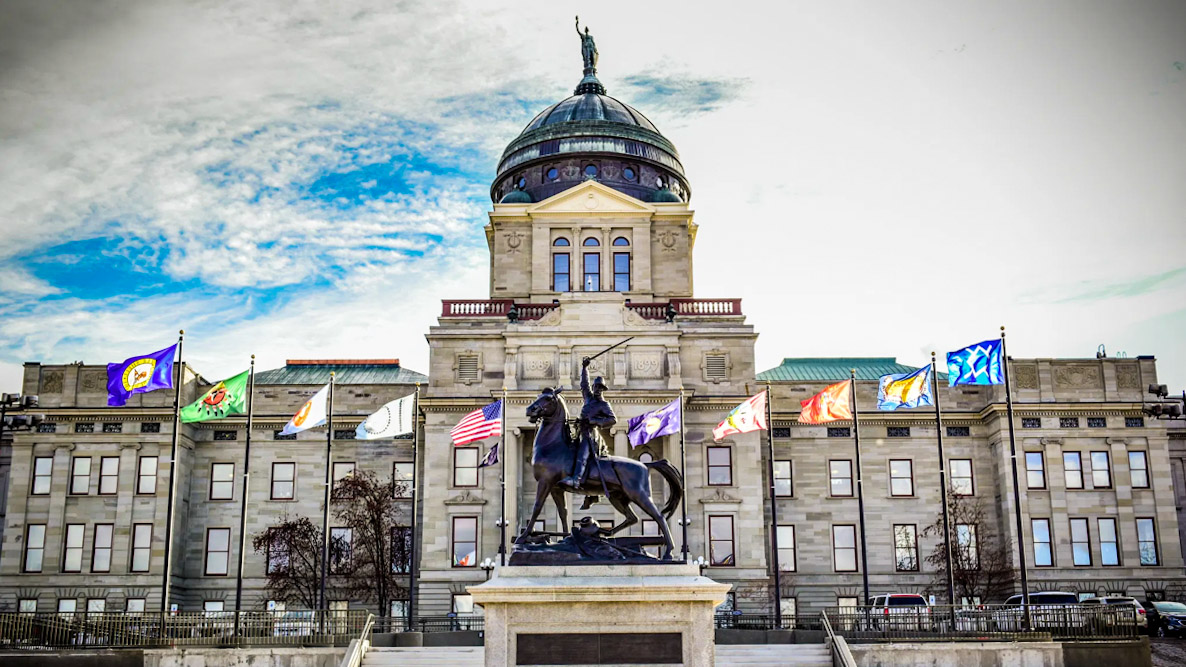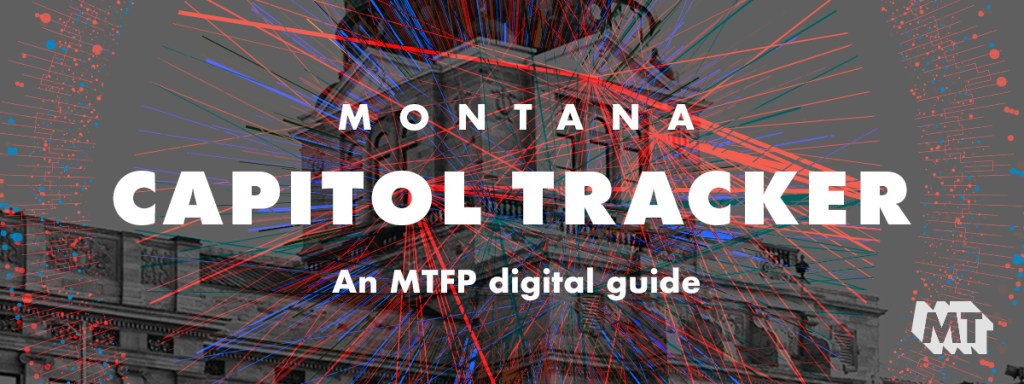Indianz.Com > News > Montana Free Press: Indian lawmakers focus on big issues

Session yields mixed results for Native lawmakers
Voting access, Indigenous languages and bison management were the big-ticket items for the Montana Legislature’s American Indian Caucus
Friday, May 21, 2021
Montana Free Press
Democratic lawmakers from Montana’s American Indian Caucus entered the 2021 legislative session with the numbers stacked against them. Minorities within a minority party, Native American lawmakers often found themselves trying to snuff measures seeking to restrict voting access, limit the presence of wild bison on Montana lands, and rework public assistance programming.
But there were successes, too. Native American lawmakers passed legislation to support Indigenous language education, and funding to address the crisis of missing and murdered Indigenous people was again approved by the Legislature and the governor. The caucus also found success working together on issues and presenting a unified message on social and natural resource issues.
Educational programs focused on Indigenous languages came out of the Legislature with mixed results. Rep. Jonathan Windy Boy, D-Box Elder, sponsored a bill that would have created funding for Indigenious language programs in the Department of Commerce. That bill was tabled in the House Education Committee, but the program was revived with funding from the Office of Public Instruction and the Office of Commissioner of Higher Education.
A related measure sought to put Indigenous language programs under the umbrella of programming that makes applicants eligible for support from the TANF, or Temporary Assistance for Needy Families, program. That bill died, but Windy Boy said he’s looking forward to taking another run at it when the Legislature meets again in two years.
Windy Boy also worked on funding for computer programming initiatives. The Legislature passed a measure that creates a scholarship program so high school teachers serving Native American youth can receive a $2,000 scholarship for professional development to learn computer programming.
MTFP launches 2021 Montana Capitol Tracker https://t.co/sq8dxkQWtC #mtnews
— Montana Free Press (@mtfreepress) January 26, 2021
FROM OFFENSE TO DEFENSE ON BISON ISSUES
Native American lawmakers started the session playing offense on bison management issues, but quickly switched to defense. Early in the session, Rep. Marvin Weatherwax, D-Browning, introduced two bills that sought to facilitate the transfer of wild bison from Yellowstone National Park to tribes and between tribes. House Bills 311 and 312 would have removed regulatory barriers relating to the quarantine of wild bison and how they can be transported. Both of those measures were tabled in the House Agriculture Committee on Feb. 23, the same day the committee passed a measure by Rep. Josh Kassmier, R-Fort Benton, that requires county commissioners to approve bison relocations in their jurisdiction. The Legislature also passed a bill by Rep. Kenneth Holmlund, R-Miles City, that changes the definition of wild bison in a way that will hamper the establishment of new herds. Kassmier’s bill was signed into law by Gov. Greg Gianforte last week, and Gianforte is expected to sign Holmlund’s bill in the coming days.
ACCESS TO VOTING, PUBLIC ASSISTANCE
When she saw some of the bills restricting voting access being considered, Rep. Sharon Stewart Peregoy, D-Crow Agency, introduced The Native Americans Voting Rights Act. The measure would have allowed voters to use nontraditional addresses when registering to vote, expanded the kinds of IDs that could be used for voter verification, and increased access to ballot drop boxes on reservations. But House Bill 613 was changed so significantly in the process that the lawmaker instead worked to successfully kill the proposal. “It got hijacked,” Stewart Peregoy said. “The governor didn’t want it and the committee tried to do what they could, but in the end we had to put it to bed, kill it, because something that could have become a useful tool could have [been] used against us.” “I’m hoping that at the federal level, we’ll get voting rights protections restored so that all these egregious bills across the country are [overridden],” she added. Stewart Peregoy said she’s also concerned about changes to public assistance programs like Medicaid. Montana’s Medicaid Expansion program used to require eligibility verification on a yearly basis, but starting July 1, the approximately 100,000 Montanans who are covered under Medicaid expansion will have to more frequently prove they qualify for the subsidized insurance. “It’s going to change the fabric of how people can access help,” she saidCOORDINATION THROUGH A DIFFICULT SESSION
This past session was the seventh Stewart Peregoy participated in, and she said it stands out for its partisanship. “Unfortunately, this session there was no bipartisanship, hardly,” she said. She added that many freshmen lawmakers came to the Capitol with little understanding of tribal sovereignty and the government-to-government dynamic that underpins the relationship between tribes and the state. She said Indigenous lawmakers also had to challenge racist attitudes from some Republican lawmakers. “The other issue is we just need to increase our numbers,” she said. “We can’t move forward with a completely Republican-dominated House and Senate. In order to do good work, we’re going to have to have some partners that are willing to not go lock-step with the party, but remember that we’re representing Montana, and Montana interests, not just one party over the other.” Lawmakers Windy Boy and Running Wolf echoed that sentiment. Windy Boy said this is the 10th session he’s served in, and he can’t recall one that was more hostile to the minority party. “This has been the most egregious of the ten. I say that because I haven’t seen [this] much meanness, [this] much hostility in the pieces of legislation that went through,” he said. Running Wolf said he thinks Native Americans and Native American issues are almost invisible to Republicans in the Legislature. “I think it was more [that] the Republican agenda doesn’t see tribal issues as important or even existent. Most Republican national agendas, we’re invisible as Native Americans,” he said. In the face of a difficult dynamic, Stewart Peregoy said she’s proud of how members of the American Indian caucus conducted themselves. She said they regularly held open meetings and worked alongside several lobbyists representing tribal interests and were able to move important pieces of legislation forward and derail some of the most harmful bills. “The teamwork that occurred during this session was phenomenal,” she said. “It goes to show that when Indian Country works together, we can stop things, we can educate on a one-on-one basis when need be, and we’re stronger for it. … I’m hopeful that we can have other young people catch the fire of regaining their voice and spreading it. It’s worth it — it’s worth serving Indian Country and Montana.”Billings native Amanda Eggert covers environmental issues for MTFP. Amanda is a graduate of the University of Montana School of Journalism who has written for Outside magazine and Outlaw Partners. At Outlaw Partners she led coverage for the biweekly newspaper Explore Big Sky. Contact Amanda at aeggert@montanafreepress.org.
Note: This story originally appeared on Montana Free Press. It is published under a Creative Commons license.
Search
Filed Under
Tags
More Headlines
Cronkite News: Community pays tribute to Congressman Raúl Grijalva
Press Release: Sen. Gallego (D-Arizona) protests firings at Department of Veterans Affairs
Native America Calling: The righteous rebellion of Indigenous punk rock
NAFOA: 5 Things You Need to Know this Week (March 31, 2025)
Chuck Hoskin: Cherokee Nation celebrates Cherokee women
Native America Calling: Tribal rights, a new restaurant and more are on The Menu
Native America Calling: Tribes vie for better access to traditional plants
Senate committee schedules confirmation hearing for Interior nominee
Fact Sheet: Department of Health and Human Services to undergo ‘dramatic restructuring’
Press Release: Department of Health and Human Services to undergo ‘dramatic restructuring’
Native America Calling: The new Social Security reality for Native elders
Montana Free Press: Hip-hop artist Foreshadow celebrates latest release
Cronkite News: Bill creates alert system for missing and murdered relatives
Bureau of Indian Affairs approves HEARTH Act regulations for Mohegan Tribe
House Subcommittee on Indian and Insular Affairs sets field hearing for self-determination anniversary
More Headlines
Press Release: Sen. Gallego (D-Arizona) protests firings at Department of Veterans Affairs
Native America Calling: The righteous rebellion of Indigenous punk rock
NAFOA: 5 Things You Need to Know this Week (March 31, 2025)
Chuck Hoskin: Cherokee Nation celebrates Cherokee women
Native America Calling: Tribal rights, a new restaurant and more are on The Menu
Native America Calling: Tribes vie for better access to traditional plants
Senate committee schedules confirmation hearing for Interior nominee
Fact Sheet: Department of Health and Human Services to undergo ‘dramatic restructuring’
Press Release: Department of Health and Human Services to undergo ‘dramatic restructuring’
Native America Calling: The new Social Security reality for Native elders
Montana Free Press: Hip-hop artist Foreshadow celebrates latest release
Cronkite News: Bill creates alert system for missing and murdered relatives
Bureau of Indian Affairs approves HEARTH Act regulations for Mohegan Tribe
House Subcommittee on Indian and Insular Affairs sets field hearing for self-determination anniversary
More Headlines